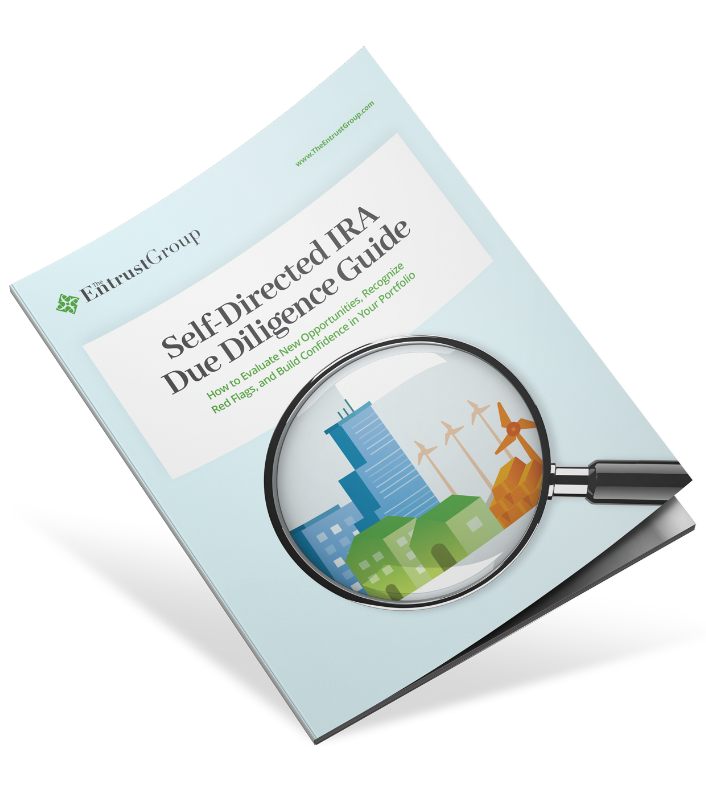6 Obstacles That Might Prevent You From Opening a Self-Directed IRA

Estimated reading time: 5 minutes
Making the most of a self-directed IRA (SDIRA) might seem pretty simple.
All you need is 10 minutes of your time to open an account, fund it, and then you can diversify your portfolio with assets like real estate, private equity, and precious metals.
However, without proper planning or a clear understanding of the IRS rules, missteps could delay or even prevent you from enjoying the benefits of an SDIRA.
Here’s a close look at six common obstacles to watch out for:

Table of Contents
- 1. The Majority of Your Retirement Funds are With Your Current Employer
- 2. Your Chosen Investment is Prohibited
- 3. Your Chosen Investments Pose Challenges for Meeting RMDs
- 4. You’re Uncomfortable Conducting Due Diligence
- 5. Failure to Plan for Real Estate Expenses
- 6. You Want the Absolutely Lowest Fees for Your IRA
- Overcome Obstacles and Unlock the Potential of an SDIRA
1. The Majority of Your Retirement Funds are With Your Current Employer
One of the easiest ways to fund a self-directed IRA (SDIRA) is by rolling over funds from a 401(k) account held with a previous employer.
However, if most of your retirement funds are tied up in a 401(k) or other employer-sponsored plan with your current employer, a rollover may not be permitted. Many plans restrict rollovers while you’re still employed. Contact your plan administrator and ask if they allow in-service withdrawals. If permitted, this could enable you to roll over 401(k) funds to an SDIRA without changing jobs.
Even if a rollover isn’t possible, you can still fund an SDIRA by transferring money from an existing IRA or making a cash contribution.
2. Your Chosen Investment is Prohibited
The IRS has clear guidelines that prohibit certain types of investments, and failing to adhere to these rules could disqualify your IRA and trigger significant tax penalties.
There are three primary categories of investments that cannot be held in an IRA:
- Collectibles: Collectibles such as artwork, antiques, rugs, stamps, coins (with some exceptions), and alcoholic beverages (like wine or whiskey collections) are not permitted. The IRS classifies these items as prohibited investments because they lack clear and consistent valuation metrics, making them difficult to regulate within an IRA.
- Life Insurance Policies: You cannot use IRA funds to purchase life insurance policies. This restriction applies to both whole life and term life insurance. The purpose of an IRA is to provide for your retirement, while life insurance is designed to offer a benefit to your heirs or beneficiaries upon your death—hence the incompatibility.
- S Corporations: IRAs are prohibited from owning shares in an S Corporation. This is because S Corporations are pass-through entities, and their structure conflicts with the rules governing IRA taxation and ownership. However, IRAs can invest in other types of entities, such as C Corporations, partnerships, and LLCs (as long as IRS guidelines are followed).
In addition, if your SDIRA engages in a transaction with a disqualified person, the entire value of the IRA may be treated as distributed on the first day of the year the prohibited transaction occurred.
Ready to learn the ropes? Dive into our SDIRA Rules Guide
3. Your Chosen Investments Pose Challenges for Meeting RMDs
One of the most popular investment options for SDIRA holders is private equity. This asset class is often appealing due to its potential for high returns, offering a higher risk-reward profile compared to traditional investments. However, private equity typically involves long holding periods, during which the asset cannot easily be sold.
If you hold a traditional SDIRA, which requires tax-deferred funds, you’ll need to start taking required minimum distributions (RMDs) once you reach age 73. Meeting RMD requirements can become challenging or even impossible if your funds are tied up in private equity assets with restrictive holding periods.
On the other hand, real estate investments offer more flexibility. Even if your entire portfolio consists of a single property, you can often meet your RMD requirements by taking an in-kind distribution—liquidating a portion of the property’s value to satisfy the RMD without selling the entire asset.
4. You’re Uncomfortable Conducting Due Diligence
Self-directed IRAs are exactly that—self-directed. The responsibility for evaluating investment opportunities rests entirely on you.
A reputable SDIRA custodian will handle recordkeeping and administrative tasks, but they will not assess the legitimacy or financial merits of any investment. It’s up to you to ensure your chosen investments align with your financial goals and abide by the IRS rules.
If you lack experience or expertise in evaluating alternative assets like real estate, private equity, or promissory notes, you may expose your portfolio to unnecessary risks or select underperforming investments.
However, if you have expertise in areas like local real estate markets or financial analysis, you could identify opportunities that deliver much higher returns than investments available in a typical 401(k) or IRA.

Self-Directed IRA Due Diligence Guide
5. Failure to Plan for Real Estate Expenses
Real estate investments often come with unexpected costs, such as property repairs, taxes, or legal fees. In an SDIRA, all expenses related to your investments must be paid directly from your IRA, not your personal funds.
If your IRA lacks sufficient liquid funds to cover these costs, maintaining the investment can become a serious challenge. Using personal funds to pay for these expenses is considered a prohibited transaction, which could disqualify your IRA’s tax-advantaged status. This may result in:
- The entire account being treated as distributed, making the total value subject to income tax
- Early withdrawal penalties if you’re under the age of 59½
To avoid these issues, it’s crucial to maintain enough liquidity in your IRA to handle any unplanned real estate expenses.
6. You Want the Absolutely Lowest Fees for Your IRA
If your highest priority is paying the bare minimum in IRA fees, SDIRAs likely aren’t right for you.
SDIRAs often come with higher fees than IRAs from traditional banks or brokerages. That’s because administering the purchase and sale of alternative assets, like real estate or private equity, is far more resource-intensive than handling publicly traded stocks or mutual funds.
Now it’s your turn to weigh those slightly higher fees against the potential advantages of an SDIRA, like:
- True portfolio diversification
- The potential for higher returns
- And the opportunity to invest in assets where you have unique expertise
As you compare providers, it’s important to understand and evaluate their fee structures. Make sure the fees align with your investment strategy and financial goals.
For investors managing multiple alternative assets, many choose to streamline with an IRA LLC for checkbook control and reduced fees. At Entrust, we take it a step further with our exclusive myDirection card, giving you the convenience of checkbook control without the complexity of setting up an LLC.
Want to see how fees might look for your portfolio?
Use our fee calculator to estimate your annual recordkeeping costs, and check out our complete fee schedule for details on any additional fees, like account establishment or asset transaction costs.
Overcome Obstacles and Unlock the Potential of an SDIRA
Opening an SDIRA an be a powerful step toward diversifying your portfolio, leveraging your expertise, and pursuing higher returns. However, understanding and addressing the potential obstacles is key to setting yourself up for success.
Whether it’s navigating prohibited investment rules, ensuring your portfolio has the liquidity to cover expenses, or meeting RMDs, preparation and careful planning are key.
If you’re ready to take control of your retirement savings or simply want to explore whether an SDIRA is the right fit for your financial goals, our SDIRA experts are here to help. Talk to your local SDIRA expert to gain the insights and information you need to make an informed decision.
Prefer to learn at your own pace? Download our free SDIRA Basics Guide. In just over 10 pages, you’ll get a clear overview of the potential benefits, IRS rules, and step-by-step guidance to help you get started.




























0 Comment